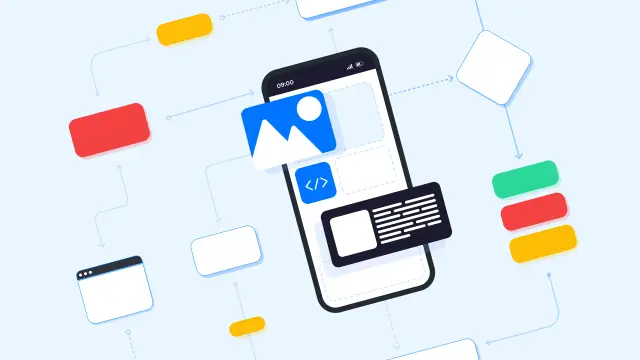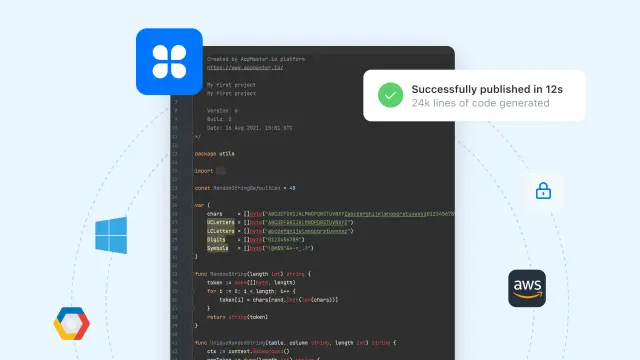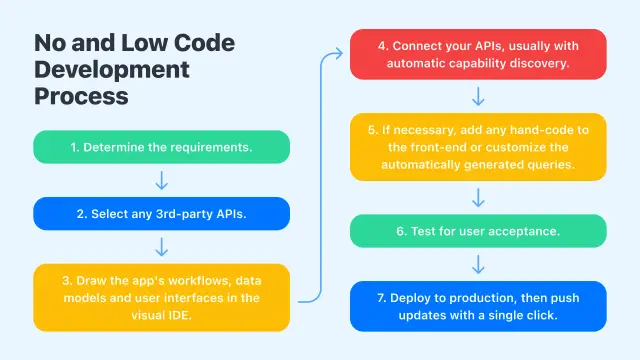How Low-Code and No-Code Development Accelerate Digital Transformation
The term "low-code" refers to developing software that calls for no code to create applications and procedures. Learn more in the article.

Instead of being a technical barrier to entry, technology should allow and encourage creativity. No code and low code do this work. It is not a technical barrier to entry, but it accelerates digital transformation. Citizen engineers are given access to user-friendly features such as drag-and-drop interfaces and editors by low-code and no-code development platform tools. These tools make it possible for non-developers to rapidly create, deploy, and maintain enterprise software applications. Examples of these non-developers include human resources departments, marketing departments, and operations teams.
Accelerate Digital Transformation using low-code and no-Code Development
Many different goals can be accomplished through digital transformation, including identifying new business opportunities, customizing customer experiences, simplifying workflows and procedures, adopting data-driven behaviors, and investigating new technological frontiers. In most cases, for an organization to successfully undergo a digital transition, it must:
-
Create new software programs, integrate systems and analytical skills;
-
Bring your apps up to date so they can run in the cloud
-
Design mobile applications that interact with customers
-
Workflows should be automated.
The majority of companies that deliver applications are having difficulty recruiting suitable tech talent; these organizations need to investigate innovative methods to satisfy the requirements related to digital transformation. Building digital solutions take a lot of time and resources, but using low-code can reduce the time and resources needed for this process. Because app-building is accessible to everybody, regardless of their level of technical ability, more people can participate in hastening the digital transition. You can accelerate digital transformation using low-code and no-code development platforms with the help of AppMaster. AppMaster.io is a no-code platform that aims to assist organizations in creating production-level applications with code generation. These applications include backend, web, and native mobile applications.
You will have complete control over the location at which your app is deployed with AppMaster.io, and you will be able to maintain your independence from the platform by exporting the source code that will allow you to scale from a minimum viable product (MVP) to an enterprise solution capable of handling millions of requests per minute.

Companies are supporting their enterprise teams and having no-code software development programs built simpler programs faster, allowing them to keep up with rapid application development. Nontechnical people may develop apps without the use of any code for their enterprise. One financial services company delivered new digital capabilities to its client portal twice as quickly as expected since business people created most of them without IT help.
What is Low-Code Development?
The term "low-code" refers to developing software that calls for no-code to create applications and procedures. Instead of using complicated programming languages, a low-code development platform makes use of graphical user interfaces. These user-friendly tools enable people with no formal understanding of code or software development to constructing applications for various reasons, such as mobile apps and business apps, without needing to have any prior experience with either of those fields. According to the research, low code can get big software projects back on track while keeping costs low and utilizing the organization's hidden technical expertise.
What is No-Code Development?
Developing and utilizing apps by developers or employing a method known as "no-code" does not need users to have any prior experience with code or understanding of programming languages. This sort of software is an example of the self-service trend, which gives business users the ability to generate, alter, and make use of data-driven applications to improve the quality of their work.
Without code, your company may indeed adopt agile development. No-code lets people design innovative solutions to alter corporate operations and fulfill client demands. Also, when there is no-code in the program development goes beyond the platform or technology. It is also said that no-code platforms in which no-code is required are a good option for building a simple application. If there is a lack of control, security flaws will arise. Because you developed the code so you know you can rely on it extensively while developing it. No code developers provide a larger developer base. A larger developer base is required for acceleration business.
Take a look at some of how low-code solutions are helping to speed up digital transformation below:
Enhanced Visual Growth and Development
Low-code platforms can cut the amount of work needed to construct new apps by 90 %, bringing the total time down from more than 6 months to less than 4 weeks. The feature of drag-and-drop may be utilized in the construction of frontend apps on the fly by developers as well as non-developers. Low-code platforms allow users to rapidly construct and test working on potential solutions, which is one of the most useful capabilities these platforms offer. By distributing low-code platforms to business users—the people who know and understand operational issues the best—low-code platforms contribute to the release of innovation. Users in the enterprise world can develop prototypes and iterate their way toward fully operational apps.

The majority of low-code app development plans may be delivered in a short time with very small to no-code necessary because a significant portion has been removed. Utilizing low-code tools provides several benefits, one of which is the capability to reuse components. Other advantages include a library of pre-built components and pre-configured modules.
Democratizing Application Development
The capacity of the existing information technology cannot keep up with the need for apps connected to running an enterprise. This indicates that the lack of available skills is the major barrier to digital transformation. Companies that deliver applications can empower teams to create high-quality solutions for everyday operations by transforming a large number of their technical workers into developers of the citizen. Citizen developers have a major role in application development.
This allows companies to meet IT security regulations and address cybersecurity concerns while still empowering teams to create high-quality solutions. When it comes to the design of apps, websites, processes, and low-code provide a straightforward user experience. Users can link their solution to many data sources and generate unique website portals using some of the most advanced low-code platforms that also offer backend integrations.
Therefore, citizen developers have the potential to increase the development resources and contribute to the acceleration of commercial value. While they focus on developers for businesses, the people in IT can deal with the more complex challenges that arise. Professional developers are usually not required during low-code and no-code development unless the application reaches a degree of complexity and compliance requirements that necessitate their integration into an enterprise.
Cost Reductions and the Capability to Develop
Users can simply connect to information from a variety of enterprise activities and grow the application by making use of pre-established connections to many data sources. The work that must be done to expand and manage applications across a whole organization or for millions of consumers is made easier by using a low-code strategy. The developers just need to construct anything once to put it into use somewhere else; this takes only minutes. The application's reach may easily be expanded from one area to another, thanks to the simplicity of cloud deployment.
Easy Data Integration
Customization is the method that produces the greatest results when trying to extract the most value out of already-in-place systems. Tools developed using low-code technology offer a high level of personalization and scalability. Low-code platforms make it possible to rapidly develop applications tailored to a specific purpose. Together with old software, these apps can be connected via API connectors or by developers. The ultimate result is a complete product. This enables teams to link with any pre-existing enterprise software such as ERP, CRM, bespoke applications, and databases by providing easy-to-use API and database integrations.
Facilitate the Management of Application Life Cycles
The primary objective is to develop apps that are adaptable to upgrades, quick, flexible, and cost-effective, and that are simplified in terms of their maintenance requirements. Users can deploy different apps with some clicks using low-code development, which speeds up the delivery of applications. This eliminates the need for users to rely on engineering or Operational teams.
The maintenance phase of software development is essential because it enables rapid changes to be made to what has already been built, which is necessary to ensure that the application continues to meet the needs of the enterprise. The concept of low-code may be summed up in its name: it entails writing less code, which reduces the amount of code that has to be maintained.
Advantages of Using No-Code Development
How precisely do citizen development, low-code, and no-code development speed an organization's efforts to build applications, processes, integrations, and analytics in the context of digital transformation? Here are some main advantages of no-code development in digital transformation:
- Accelerate the process of acquiring needs. Low-code platforms allow developers to rapidly prototype user experiences, spending less time on wireframes and more intricate designs. End customers who are shown a rapid prototype are more likely to offer input on what they truly desire, which ultimately results in more specific needs.
- Iterate flexibly. Agile approaches are an essential component of digital transformations because they allow teams to enhance apps based on feedback gathered throughout each sprint. Because low-code encourages rapid application development and abstracts many technical details, agile teams can demonstrate changes to stakeholders at sprint reviews and produce a viable product more rapidly.
- Boost mobile experiences. Low-code typically features the tools necessary to improve experiences across several other programs, including the web, mobile devices, and tablets. Many of them package the finest user experience and design techniques.
- Build with protective barriers. Creating an application is more than simply writing code; rather, it entails the execution of procedures to guarantee the dependability, performance, and security of the experience.
- A portion of this complexity may be abstracted away by low-code development and the tools that go along with it, but only up to the point where developers embed their custom code in the application.
Providing support and enhancements without the complexity of programming. Application maintenance and modernization become significantly more difficult when you have to work with complicated code that is not documented. Compared to the alternative of reading through hundreds of lines of code that utilizing a visual tool makes it far simpler to comprehend the business logic, processes, and data conversions.
Conclusion
Low-code and no-code technology have aided organizations in adapting to a post-pandemic enterprise climate while maintaining competitiveness. Well, low-code solutions will account for 65 % of application building shortly for various reasons, the most important of which are problems with productivity, shortages of skills, and backlogs of business projects. When we consider the future, we can see that low-code platforms will play an essential role in facilitating the acceleration of digital transformation.
Low-code plans use graphical user interfaces that include basic logic and drag-and-drop capabilities rather than employing complicated programming languages. This makes it possible for users to become proficient in a single system, making them easy enough to be utilized by virtually everyone employed inside the institution. The use of low-code does not eliminate the need for developers as they are equally important. It frees people from the chores that they fear the most, which enables them to concentrate on the aspects of their jobs that make them genuinely important and the aspects of their jobs that both challenge and intrigue them.





